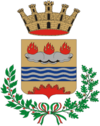Éboli
| Eboli | ||
|---|---|---|
| Comune | ||
| Comune di Eboli | ||
 |
||
|
||
| Location of Eboli in Italy | ||
| Coordinates: 40°36′58.53″N 15°03′17.69″E / 40.6162583°N 15.0549139°E | ||
| Country | Italy | |
| Region | Campania | |
| Province / Metropolitan city | Salerno (SA) | |
| Frazioni | Campolongo, Cioffi, Corno d'oro, Fiocche, Santa Cecilia, Taverna Nova | |
| Government | ||
| • Mayor | Martino Melchionda (PD) | |
| Area | ||
| • Total | 138.7 km2 (53.6 sq mi) | |
| Elevation | 145 m (476 ft) | |
| Population (31 December 2010) | ||
| • Total | 38,652 | |
| • Density | 280/km2 (720/sq mi) | |
| Demonym(s) | Ebolitani | |
| Time zone | CET (UTC+1) | |
| • Summer (DST) | CEST (UTC+2) | |
| Postal code | 84020, 82025 | |
| Dialing code | 0828 | |
| Patron saint | Saint Vitus | |
| Saint day | June 15 | |
| Website | Official website | |
Eboli is a town and comune of Campania, southern Italy, in the province of Salerno, on the south edge of the hills overlooking the valley of the Sele.
An agricultural centre, Eboli is known mainly for olive oil and for dairy products, among which the most renowned is the buffalo mozzarella from the area.
The archaeological excavations prove that the area of Eboli has been inhabited since the Copper and Bronze Ages, and also attested (from the 5th century BC) is the presence of the so-called Villanovan civilization.
The ancient Eburum was a Lucanian city, mentioned only by Pliny the Elder and in inscriptions, not far distant from the Campanian border. It lay above the Via Popilia, which followed the line taken by the modern railway. The Romans gave it the status of municipium.
The town was destroyed first by Alaric I in 410 AD, and then by the Saracens in the 9th and 10th centuries. Later it was a stronghold of the Principality of Salerno, with a massive castle built by Robert Guiscard.
During the 1930s Eboli was able to expand into the plain after a project of land reclamation carried out by the Fascist government. It was severely damaged during the 1980 Irpinia earthquake.
Eboli is located at the feet of Montedoro, a peripheral spur of the Monte Raione-Monte Ripalta group. Its territory, which is 90% plain, is formed by the alluvial plain of the Sele river, which bounds it southwards. The remaining part comprises hills part of the Monti Picentini Regional Park.
...
Wikipedia


